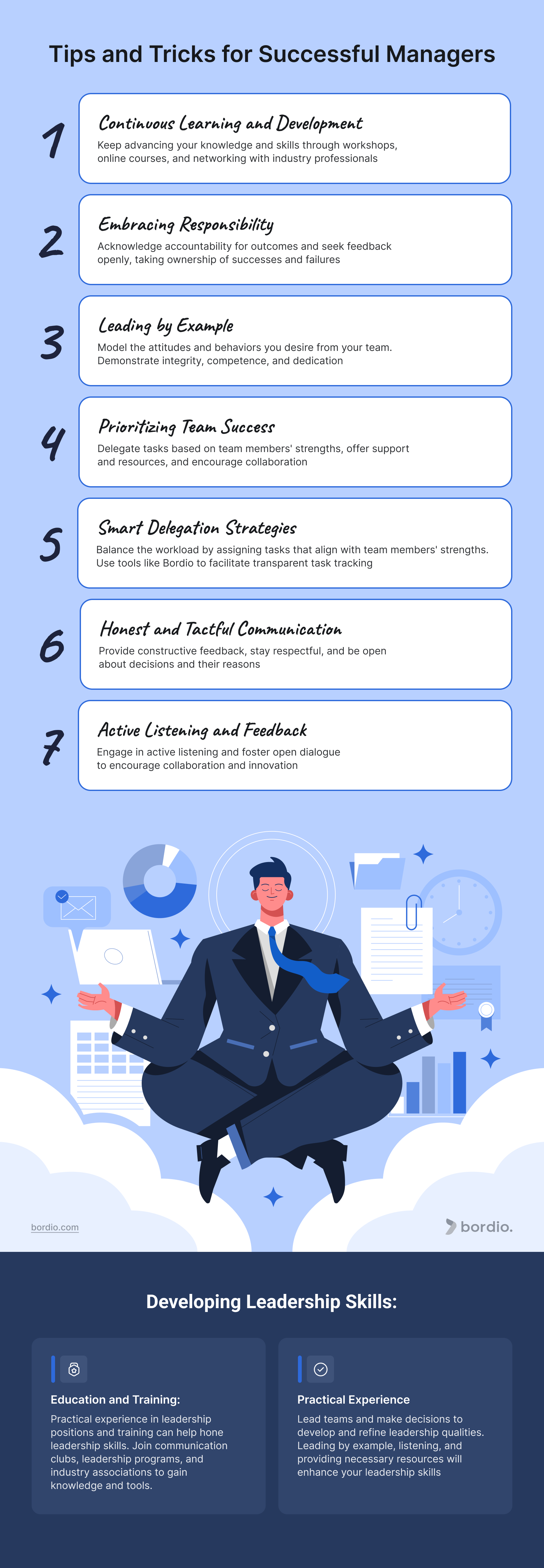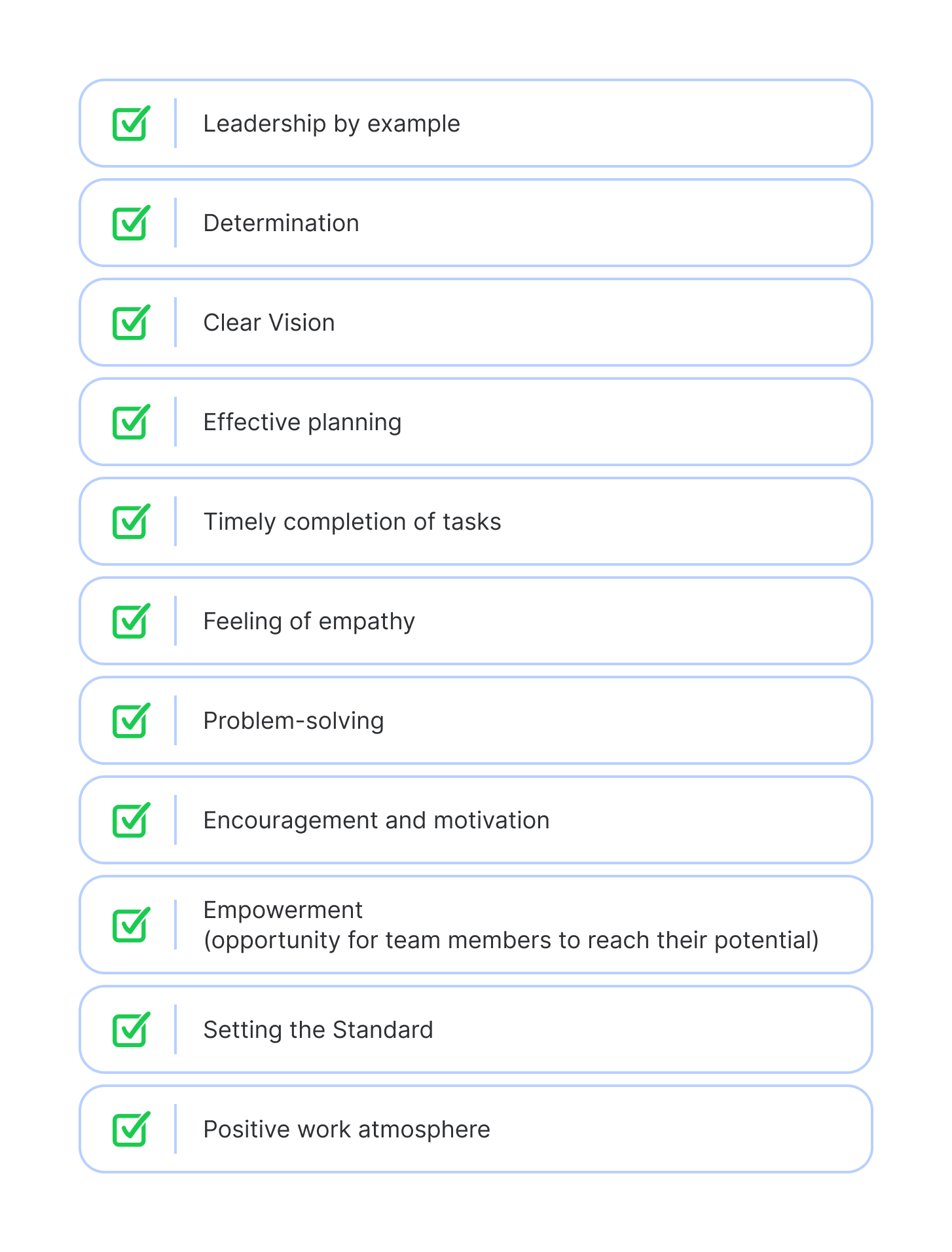Managers may find various aspects of team management and leadership inspiring and challenging. This guide will provide practical tips and techniques to support managers in developing their skills for effectively leading their teams.
Who is a good team manager?
An excellent manager leads by setting an example for the team, taking decisive action, and having a clear vision. They can plan ahead effectively, stay organized, and complete tasks on schedule.
Understanding and caring about other team members’ feelings creates a better work atmosphere. It’s essential to solve problems and change plans when needed. An effective manager gives the team encouragement, motivation, and assistance when required. By empowering individuals to excel, setting the standard through personal dedication, and cultivating a positive work environment, they enable all to achieve at their highest level.
What challenges do managers face, and How do they solve them?
Being brave means embracing your anxieties head-on rather than never being afraid! While confronting challenges is inevitable in leadership, true mastery lies not in evasion but in facing difficulties with poise and resolve. Managers deal with various challenges, such as addressing disagreements, balancing several tasks, and communicating problems. What should managers focus on?
1. Communication problems
Communication issues with stakeholders, other departments, and their own teams are common problems for managers. Misunderstandings, imprecise instructions, or disparities in communication styles can all lead to these issues. How do we make team communication better and avoid these problems?
Clearly state team goals, expectations, and duties to ensure everyone knows their roles and what’s expected of them. Provide clear instructions and feedback to avoid confusion. Listen carefully when individual team members talk without interrupting. Best managers comprehend members’ perspectives and the issues they are concerned about(emotional intelligence is essential!).
Establish an instant messaging channel focused on feedback so team members can express their thoughts and ideas without feeling awkward and send direct reports to their supervisors. For example, have regular team meetings and one-on-one chats, connections through messengers, and team management software. Try a variety of communication channels, such as meetings, emails, and instant messaging, to have convenient conversations for all parties. Consider using a team task board to enhance team communication and keep everyone on the same page.
By dealing with communication issues early and ensuring everyone can speak up, managers can improve the team’s collaboration, get more done, and strengthen friendships.
2. Team conflicts
Managers frequently deal with conflicts arising from personality or work style differences and competing priorities. If these disputes are not resolved quickly and amicably, they can interfere with team chemistry, lower morale, and reduce productivity. How can we solve team conflicts or even prevent them before they start and increase productivity?
Create a safe space where team members can freely share their concerns. Listen carefully to understand conflicts and step in early to solve them positively. Encourage empathy and help find solutions that work for everyone.
Set clear expectations and rules for how the team works together to avoid misunderstandings and conflicts. Plan activities that bring the team closer together, making it easier to solve problems together.
Lead by example in how you handle conflicts and talk to your team. Managers can improve team relationships and employee performance by openly addressing conflicts and promoting respect and teamwork.
3. Decision making
Managers frequently encounter problems when making decisions, especially in complex or unclear situations. Factors such as poor performance, time constraints, conflicting priorities, and incomplete information can complicate decision-making, making it hard to agree on a course of action or identify the most suitable solution.
How do you decide on a pro? Let’s see:
- Gather all needed info and data about the issue.
- Get input from others, like team members or experts, to see different sides.
- Think about how the decision will affect everyone involved.
- Examine the advantages and disadvantages of each choice.
- Make a list of your objectives and stick to them.
- To make sure you don’t waste time, create a schedule and stick to it.
4. Loss of motivation
Even if you are good at making decisions and have a good schedule, there may come a time when you lose motivation. This loss of motivation may stem from various factors, including burnout, lack of recognition, or unclear goals, and can lead to decreased productivity and employee engagement from within the team. You or your team members can burn out at any time, so how can you prevent it?
What does the loss of motivation mean? What are the reasons? Understand why team members feel unmotivated. To do this, talk to them in one-on-one meetings or use surveys to find out why. This way, you can take concrete action on your problem!
Tip: If you are an employee, check our 1-on-1 meeting with manager tips.
To prevent this situation, set clear goals so everyone knows what to do. Keep them informed of their progress to keep them motivated. Create a positive, collaborative work environment where everyone feels respected, and job satisfaction is increased. Using a work productivity tracker can also be beneficial for managing and monitoring productivity levels. These simple actions can motivate people because everyone needs to see that their work is not just an action but has meaning.
5. Work-life balance
Managers can struggle to maintain an excellent work-life balance for themselves and their team members. In today’s fast-paced workplace, boundaries between work and personal life can become blurred, increasing stress and decreasing mental health and well-being, primarily if you work remotely.
Tip: If you are new to remote work and managing remote teams, then check out our guide on How To Manage Remote Team Like A Pro!
You need to set boundaries and remember to take a rest, both for yourself and for your employees. Encourage them to follow suit and emphasize the value of maintaining balance. You also need to indicate when they should be available for work and when they should not be available.
Be flexible and understand if they have personal needs. Help them manage their time better by giving them tips and project management tools. Encourage breaks during the day and take vacations to relax. Finally, the workplace should be supportive and open so employees feel comfortable discussing work-life balance. Be understanding and flexible with their personal needs.
Tips and tricks for successful managers
1. Continuous learning and development
Managers must continuously advance their knowledge and abilities. It entails keeping up with the most recent tactics and trends in both management style and leadership. They should, for instance, concentrate on effectively managing their time, inspiring their colleagues, and making wise decisions.
One way to achieve this is to look for opportunities to grow and learn proactively. It could entail enrolling in pertinent online or live classes or workshops on dispute resolution, cooperation, and leadership. Additionally, attending conferences, joining industry associations, and networking with other professionals in the sector can benefit managers. Using a team tracker to monitor the progress and effectiveness of the learning initiatives can also be beneficial. This tool helps keep track of the team’s development goals and ensures that all members advance their skills effectively.
These exercises provide insightful information and best practices to help them develop their managerial abilities.
Managers who prioritize lifelong learning provide themselves with the resources and skills necessary to meet challenges in leadership.
2. Embracing responsibility
Embracing responsibility as a manager involves acknowledging accountability for the outcomes of your team’s efforts, including both successes and failures. When things go well, it’s essential to recognize and celebrate achievements, giving credit to the team where it’s due. Conversely, effective managers take ownership of the situation when there are setbacks or mistakes.
Addressing feedback openly means being receptive to input from team members, superiors, or other stakeholders. Whether the feedback is positive or negative, managers should approach it with an open mind, seeking to understand and learn from it. They should also take proactive steps to address any areas for improvement or concerns raised.
Similarly, good leaders don’t deflect blame or make excuses when mistakes occur. Instead, they take responsibility, acknowledging where things went wrong and working to rectify the situation. It involves implementing corrective actions, offering apologies where necessary, and ensuring that lessons are learned to prevent similar issues in the future.
Work management software like Bordio can support this process by providing a structured approach to managing feedback, errors, and accountability. Bordio offers various ways for team members to communicate, such as writing notes, commenting on tasks, and chatting to share feedback. This online task planner boosts teamwork by enabling everyone to exchange ideas, ask questions, and provide feedback more efficiently.
3. Leading by example
Setting a good example is also essential to management and the organization’s success. By modeling the attitudes and behaviors they desire from others, good managers help mold their teams’ culture and behavior.
Great managers need to be consistent. Managers who exhibit a great work ethic, professionalism, and honesty consistently create a positive example for others. Managers provide an example that upholds the organization’s principles and motivates team members to take responsibility for their actions by following the regulations.
Furthermore, setting a good example fosters respect and trust. Managers gain credibility and authenticity when they exhibit the traits and principles they appreciate in others. Managers who lead by example are respected and trusted by their team members, which improves company culture and morale and fortifies bonds.
4. Prioritizing team success
Managers are essential to guaranteeing the success of their teams. Delegation done well is essential. Managers enable their team members to contribute effectively by providing assignments that align with their strengths and abilities. In addition to completing things quickly, this instills a sense of accountability and dedication among team members.
Understanding what each team member is good at is also essential. Supervisors should know every team member’s preferences, shortcomings, and strengths to distribute work sensibly and offer the appropriate assistance. Managers can increase team success and overall performance by utilizing the other team member’s varied abilities.
Furthermore, encouraging and supporting others is crucial to creating a cooperative and effective atmosphere. Supervisors should support their staff by providing direction, criticism, collaboration tools, and resources as required.
5. Smart delegation strategies
Delegating tasks effectively is crucial for leadership. It is also crucial for everyone, including managers and those overseeing managers. As a supervisor, knowing how to assign tasks effectively is essential. It means giving specific responsibilities to managers, making decisions about individual team members, and overseeing various functions. What are the benefits of delegating tasks to managers?
Firstly, it balances the workload, allowing supervisors to focus on more important matters.
Secondly, it provides valuable learning opportunities for managers as they tackle different challenges, aiding their personal and professional growth.
And finally, it helps managers develop essential leadership qualities, such as building trust and fostering teamwork.
Using a team task tracker like Bordio can significantly assist delegation. Bordio allows you to centralize all task-related information, including projects, deadlines, and responsible team members. When tasks are visible to the entire team in one place, it enhances transparency and organization. Managers can efficiently distribute tasks, set deadlines, and provide instructions using Bordio. This simplifies the delegation process and ensures tasks are efficiently managed.
6. Honest and tactful communication
To effectively lead, one must communicate with tact and honesty. Managers must be honest and thoughtful when providing criticism and making difficult decisions. Even when giving critical comments, it’s crucial to concentrate on particular behaviors rather than character attributes. It makes the criticism more likely to be helpful and encourages professional growth and development rather than defensiveness.
Maintaining professionalism is crucial. It means staying respectful and composed, even in difficult situations. It also means choosing words thoughtfully and delivering feedback with empathy.
Transparency also builds trust within the team. Leaders should be open about decisions and their reasons. Explaining helps team members understand the context behind decisions, boosting trust and confidence in leadership.
7. Active listening and feedback
Active listening is essential for managers. It entails paying attention to team members’ concerns and genuinely understanding what they have to say. Respect and trust are developed when supervisors listen intently and genuinely engage with their subordinates’ opinions. This type of exchange fosters open communication among the team.
Providing feedback is equally important. Team members can develop by receiving constructive criticism, which shows them where they are strong and where they can improve. Supervisors should routinely provide input on their team members’ performance, commend them for their efforts, and offer advice on improvement. This feedback loop is essential to ensuring that everyone recovers and feels supported.
Promoting open dialogue is also crucial. Supervisors encourage collaboration and innovation by allowing team members to express their ideas, concerns, and criticism. When team members feel respected and heard, they are likelier to share brilliant ideas and collaborate effectively. In addition to improving team performance, this collaboration encourages innovation and creativity inside the company.
Can anyone become a good manager?
It is generally accepted that leadership qualities are part of a person’s character or temperament, which must be present from birth or formed as an adult. Of course, this is partly true because some people are naturally inclined to be effective team leaders, but many can improve their leadership skills through effort and the appropriate resources. Let’s dive into this topic: How can you develop skills even as an introvert?
Education and training
If you are not an extrovert, then you should start with communication skills in general and not immediately with command and leadership. Conversation clubs and psychological practices of communicating with strangers will help you develop communication skills. The master classes, seminars, and leadership programs will give you the knowledge and valuable tools you need to be a budding leader. These resources cover critical aspects of leadership, including effective communication, conflict resolution, and decision-making.
Practical experience
Practical experience in leadership positions, whether formal or volunteer, is critical to honing leadership skills. Leading teams, making decisions, and solving problems promote skill development. Leadership is not just about being outgoing or charismatic; it’s about inspiring and empowering others. Lead by example by demonstrating integrity, competence, and dedication in your work. Show your team members that introverts can be influential leaders through your actions and decisions. Leading by example, listening to people, and providing necessary resources such as AI and time management tools will elevate you as a leader.











